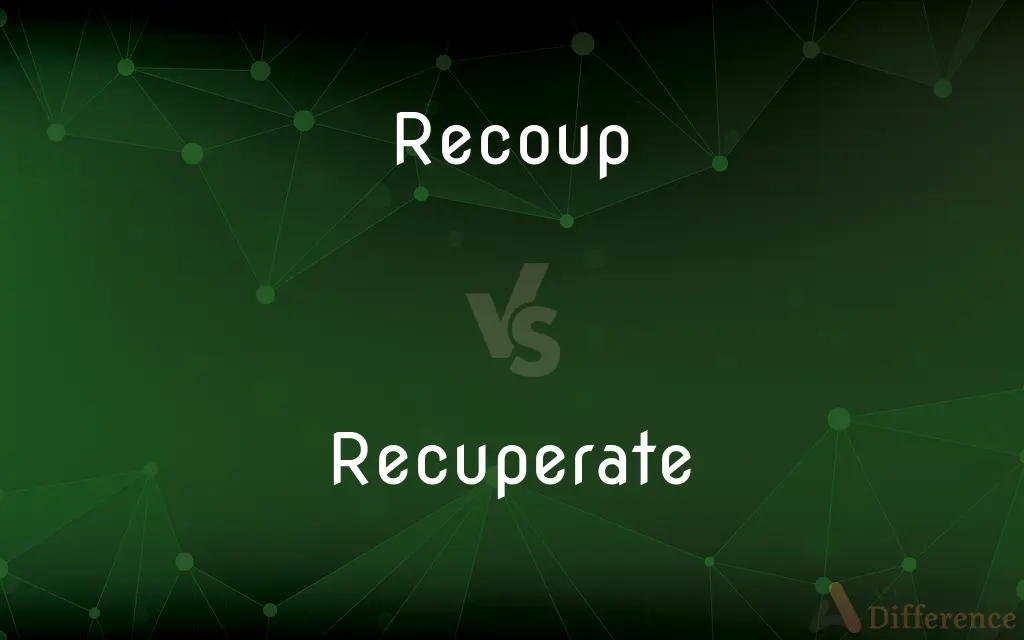Recoup vs. Recuperate — What's the Difference?
By Maham Liaqat & Urooj Arif — Updated on April 8, 2024
Recoup involves regaining lost money or resources, focusing on financial or material recovery, while recuperate emphasizes health and strength recovery after illness or exertion.

Difference Between Recoup and Recuperate
Table of Contents
ADVERTISEMENT
Key Differences
Recoup is primarily used in contexts where there's a need to regain something lost, especially money or equivalent resources. It often involves actions taken to restore financial health or retrieve lost assets. Whereas recuperate is specifically associated with the process of regaining health, strength, or well-being after an illness, injury, or period of exertion. This distinction highlights the contexts in which each term is most appropriately used.
In the business world, companies aim to recoup investments through various strategies to ensure financial stability and growth. This involves recouping costs by increasing sales, reducing expenses, or other financial maneuvers. On the other hand, recuperate is used more in personal health or well-being contexts, where the focus is on taking the necessary time and measures to restore one’s health or recover from physical or mental fatigue.
When someone seeks to recoup losses, the emphasis is on the tangible aspect of what was lost and can be quantified, such as money, time, or resources. This process is often calculative and strategic, aimed at mitigating or reversing losses. Conversely, recuperating involves a more intangible and personal journey of healing, which can be physical, emotional, or mental, and is inherently less quantifiable.
Recoup can sometimes imply a sense of urgency or immediate need to regain lost ground or assets, driven by external pressures or necessities. It carries a proactive approach towards recovery of losses. In contrast, recuperate suggests a natural, sometimes gradual process of healing, often necessitating rest and disengagement from regular activities to allow for recovery.
Despite their differences, both recoup and recuperate convey a sense of return to a former state or condition, whether it be financial health or physical well-being. However, the means and areas of application for each term clearly delineate their distinct uses and implications in various contexts.
ADVERTISEMENT
Comparison Chart
Primary Focus
Financial/material recovery
Health/strength recovery
Context
Financial, business, legal
Health, personal well-being
Nature of Recovery
Tangible, calculative
Intangible, gradual
Urgency
Often implies immediacy and strategy
Suggests a natural, sometimes slower process
Outcome
Regaining lost money, resources, or ground
Regaining health, strength, or well-being
Compare with Definitions
Recoup
To make up for something.
He's trying to recoup the time lost during the system outage.
Recuperate
To restore to a state of health or normality.
The vacation allowed her to recuperate fully.
Recoup
To recover financial losses.
She managed to recoup her losses through a series of smart investments.
Recuperate
To gain or regain energy or vitality.
A short nap can help you recuperate your energy.
Recoup
To reclaim or retrieve.
The team hopes to recoup their initial success with their next project.
Recuperate
To recover from sickness or exertion.
She took a week off to recuperate from the flu.
Recoup
To reimburse or compensate.
Insurance helped to recoup the costs of the damages.
Recuperate
To recover after financial loss, less commonly.
The business is slowly recuperating from its financial setbacks.
Recoup
To regain something lost or expended.
The company plans to recoup its investment within three years.
Recuperate
To regain health or strength.
He is recuperating at home after the surgery.
Recoup
Regain (something lost or expended)
He's just resting, recouping from the trial
Sleep was what she needed to recoup her strength
Rains have helped recoup water levels
Recuperate
Recover from illness or exertion
She has been recuperating from a knee injury
Christmas is a time to recuperate
Recoup
To get back; recover or regain
Recoup a loss.
Recoup one's dignity.
Recuperate
Recover or regain (something lost or taken)
They will seek to recuperate the returns that go with investment
Recoup
To gain an amount equal to (an outlay or investment)
Expected to recoup the development costs in three years.
Recuperate
To return to health or strength; recover.
Recoup
To restore; replenish
"urged [her] to catch up on sleep and recoup her utterly spent resources" (Bernard Lown).
Recuperate
To recover from financial loss.
Recoup
To reimburse (someone) for a loss or expenditure.
Recuperate
To recover (a financial loss).
Recoup
(Law) To reduce (the amount of a monetary claim made by a party in a legal action) because of a failure of that party to perform an obligation under the contract or law related to the claim.
Recuperate
To recover, especially from an illness; to get better from an illness.
Recoup
To recover from loss or exhaustion; recuperate
Needed to recoup after the strenuous campaign.
Recuperate
(sociology) To co-opt subversive ideas for mainstream use
Recoup
To make back, as an investment.
He barely managed to recoup his money. He sold out for just what he had invested.
To recoup losses made at the gaming table
Recuperate
To recover health; to regain strength; to convalesce.
Recoup
To recover from an error.
Recuperate
To recover; to regain; as, to recuperate the health or strength.
Recoup
(legal) To keep back rightfully (a part), as if by cutting off, so as to diminish a sum due; to take off (a part) from damages; to deduct.
A landlord recouped the rent of premises from damages awarded to the plaintiff for eviction.
Recuperate
Regain or make up for;
Recuperate one's losses
Recoup
(transitive) To reimburse; to indemnify; often used reflexively and in the passive.
Recuperate
Regain a former condition after a financial loss;
We expect the stocks to recover to $2.90
The company managed to recuperate
Recoup
To keep back rightfully (a part), as if by cutting off, so as to diminish a sum due; to take off (a part) from damages; to deduct; as, where a landlord recouped the rent of premises from damages awarded to the plaintiff for eviction.
Recuperate
Restore to good health or strength
Recoup
To get an equivalent or compensation for; as, to recoup money lost at the gaming table; to recoup one's losses in the share market.
Recuperate
Get over an illness or shock;
The patient is recuperating
Recoup
To reimburse; to indemnify; - often used reflexively and in the passive.
Elizabeth had lost her venture; but if she was bold, she might recoup herself at Philip's cost.
Industry is sometimes recouped for a small price by extensive custom.
Recoup
Reimburse or compensate (someone), as for a loss
Recoup
Regain or make up for;
Recuperate one's losses
Recoup
Retain and refrain from disbursing; of payments;
My employer is withholding taxes
Common Curiosities
Can recoup be used in terms of health?
While less common, recoup can be used in broader senses, including recovery from non-financial losses, but recuperate is the preferred term for health recovery.
What does recuperate mean in medical terms?
In medical terms, recuperate refers to the process of recovering health, strength, or well-being after illness, injury, or medical treatment.
What does it mean to recoup losses?
To recoup losses means to recover money or resources that have been lost, usually through financial strategies or additional efforts.
Is recuperate only related to health?
Primarily, yes, recuperate is mainly related to recovering from health issues, though it can metaphorically apply to other forms of recovery.
Can recuperate and recover be used interchangeably?
While similar, recuperate often carries connotations of a gradual process and is specifically used for health, making it not always interchangeable with recover.
Can a business recuperate?
Yes, a business can recuperate in the sense of recovering from financial setbacks or losses, though this use is less common compared to health contexts.
How do I use recoup in a sentence?
"Following the market downturn, the investor aimed to recoup his initial investment through careful stock selection."
What does it mean to recoup time?
To recoup time means to make up for time that was lost or wasted, often by working more efficiently.
How do I use recuperate in a sentence?
"After her surgery, she took a month off work to recuperate at home."
What is the difference between recoup and recover?
Recoup specifically refers to regaining lost or spent resources, especially money, while recover can be used more broadly to include health, position, or situation.
What is the process of recuperation?
The process of recuperation involves resting and taking necessary actions to regain health or strength after illness or exertion.
Is recuperate a slow process?
Recuperation can be a slow process, depending on the severity of the illness or exertion from which one is recovering.
Can I use recoup for emotional losses?
Recoup is generally used for tangible losses, but it can be metaphorically extended to emotional or intangible recoveries.
Does recuperate always involve rest?
While rest is often a key component of recuperation, especially in health contexts, the specific needs for recuperation can vary depending on the situation.
How can a company recoup its investment?
A company can recoup its investment through profit-making strategies that exceed the initial expenditure on that investment.
Share Your Discovery

Previous Comparison
Capricorn vs. Capricornus
Next Comparison
Saloon vs. SedanAuthor Spotlight
Written by
Maham LiaqatCo-written by
Urooj ArifUrooj is a skilled content writer at Ask Difference, known for her exceptional ability to simplify complex topics into engaging and informative content. With a passion for research and a flair for clear, concise writing, she consistently delivers articles that resonate with our diverse audience.














































